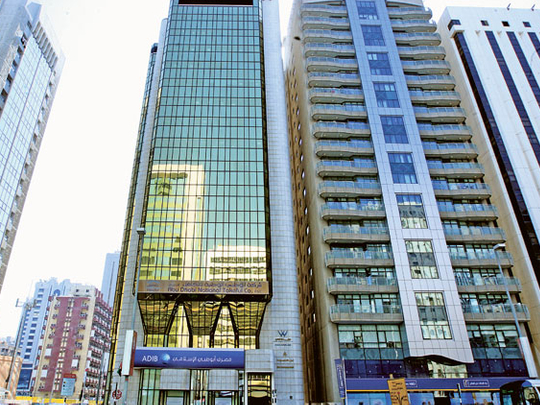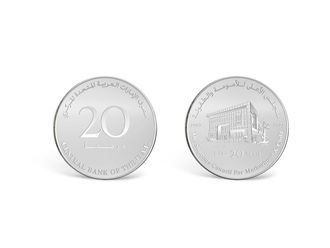
Abu Dhabi: Abu Dhabi government bond yields rose on concern Gulf states may be affected by escalating tension in Iran, reducing their discount to debt of the emirate's banks to the lowest in more than two months.
The yield gap between Abu Dhabi's 5.5 per cent bond due April 2014 and state-run National Bank of Abu Dhabi bonds of a similar maturity has fallen 22 basis points (bps) to 125 so far this year.
It had dropped to 119.6 basis points, the lowest since November 2, on January 16. That day Iran said "no country" would be able to manage the shock of it disrupting traffic through the Strait of Hormuz.
Iran's warning in response to the threat of a European Union oil embargo and tougher US sanctions sent perceptions of Abu Dhabi's credit default risk to the highest in almost two years.
About 20 per cent of the world's oil flows through Hormuz, which is 34km wide at its narrowest point, according to the US Energy Information Administration.
"Sovereign bonds are the closest proxy through which investors can express their concerns about geopolitical issues," Chavan Bhogaita, the head of markets strategy group at NBAD, Abu Dhabi's biggest bank, said in an email on Monday.
Name-specific risk
"The banks, government-related entities and other corporations are much more name-specific risk."
The emirate's five-year credit default swaps were at 141 on Tuesday, after dropping to as low as 98 at the end of October, according to data provider CMA, which is owned by CME Group and compiles prices quoted by dealers in privately negotiated markets.
Qatar's contracts have risen 13 basis points this year, also to 141.
Abu Dhabi, home to more than 7 per cent of the world's proven oil reserves, holds the third-best credit rating at both Moody's Investors Service and Standard & Poor's. NBAD's rating is one level below the Abu Dhabi government at Moody's and two lower at S&P.
The yield on Abu Dhabi's 5.5 per cent bond has risen 13 basis points since Iran first vowed on December 27 to halt traffic through Hormuz to 1.62 per cent yesterday.
By comparison, the yield on NBAD's 4.5 per cent bond due September 2014 dropped 12 basis points to 2.9 per cent. The yield on the 4.75 per cent bond of Abu Dhabi Commercial Bank, the emirate's second-biggest bank, posted a 10 basis-point decline in the period.
This disparity was the result of "a knock-on effect from the CDS," Abdul Kadir Hussain, chief executive officer of Mashreq Capital DIFC Ltd, said in a phone interview on Monday.
"It's because of Iran, Syria, the overall situation, but Iran is in the headlines at the moment."
Abu Dhabi sovereign debt yields also climbed as the average yield on Arabian Gulf bonds fell 6 basis points since December 27 to 5.01 per cent on Tuesday, according to the HSBC/Nasdaq Dubai GCC Conventional US Dollar Bond Index.
EU embargo
Gulf states rely on sales of energy products for as much as 93 per cent of state revenue. European Union foreign ministers agreed on Monday to ban oil imports from Iran starting July 1 as part of efforts by Western nations to pressure the Islamic republic over a nuclear programme they say aims to build weapons, a charge Iran denies.
The embargo will "bear bitter fruit," Iran's Foreign Ministry said this week. The state's Oil Ministry added the move may lead to "heavy economic loss and damages to the crisis-stricken people of Europe."
Abu Dhabi wants non-oil revenue to account for 64 per cent of the total by 2030, from an average of 41 per cent between 2005 and 2007.
UAE banks are starting to recover from a slowdown in credit growth after the global debt crisis triggered a real-estate slump, slowed tourism and trade and investment banking revenue plunged.
Loan growth rose to 4.2 per cent in the first 11 months of 2011, according to Central Bank data, after slowing to between 1 per cent and 3 per cent in 2009 and 2010.
Increase in loans
NBAD's lending grew 13.6 per cent in the first nine months of 2011, while Abu Dhabi Commercial Bank posted a 1.2 per cent increase in loans over the period.
UAE bank lending may grow in the low single digits this year, similar to 2011, Timucin Engin, a Dubai-based associate director at Standard & Poor's, said on January 9.
Investors based in the Middle East have buoyed demand for Abu Dhabi bank debt.
They accounted for 69 per cent of investors who bought into First Gulf Bank's $500 million Islamic bond this month, compared with 15 per cent from Europe and 16 per cent from Asia.
Longer time horizon
"Local demand helps provide support for regional bonds, because local investors often hold the bonds for longer time horizons," Nick Stadtmiller, head of fixed-income research at Emirates NBD, the UAE's biggest bank, said in an email on Wednesday.
"Just about all of the Abu Dhabi-based bank bonds traded in the market mature within the next five years, making them more popular with local investors," who prefer shorter maturities.
- 2.9%: yield on NBAD's4.5% bond
- 5.01%: Abu Dhabi's sovereign debt yields on Tuesday
- 141: Abu Dhabi's 5-year credit default swaps (in bps)
- 98: Abu Dhabi's 5-year CDS in October 2011 (in bps)












